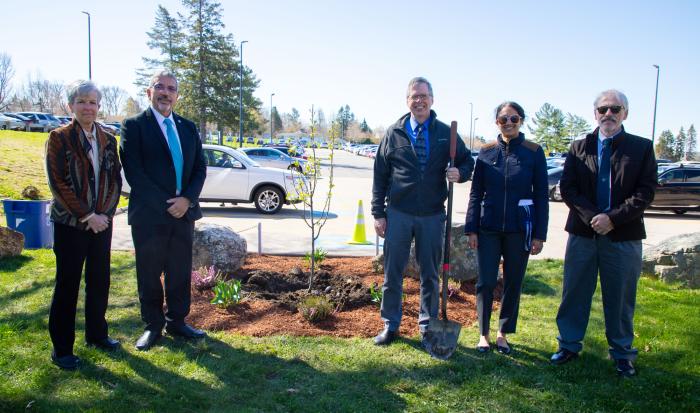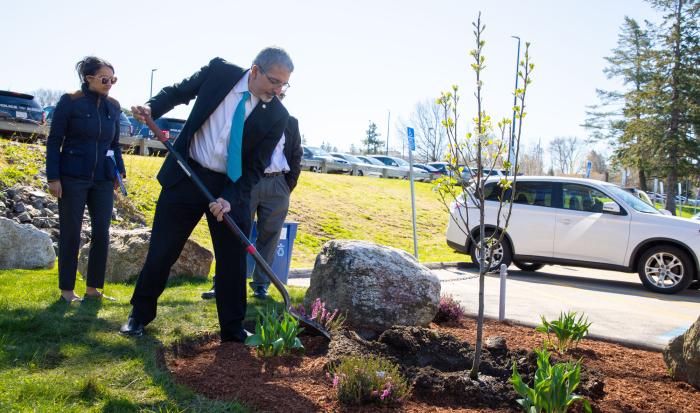

QCC's Environmental Sciences department acknowledged the importance of Earth Day with empowering activities throughout the last week of April, including a tree planting ceremony, a scavenger hunt and a guest speaker.
Dean of the School of Math & Science Ben Benton, Professor of Environmental/Physical Science Mark Duvall, QCC President Dr. Luis Pedraja, Interim VP of Academic Affairs Kathy Rentsch and Professor of Environmental/Physical Science/Coordinator of Liberal Arts-Environmental Science Option Anita Soracco all helped to plant a new tree outside of the QuEst Center to symbolize the ongoing effort we must put in to maintain a healthy ecosystem.
On April 25, Hannah Evans, the communications manager at Population Connection, a grassroots organization that advocates for stabilizing the world's population, spoke to the QCC community about recent projects and how to positively contribute to the Earth's environmental sustainability.
While population growth has slowed in some ways, Evans noted that the exponential growth since 1800 was unprecedented and this, combined with a reliance on fossil fuels and a culture of consumption, has contributed to the climate change issues we are seeing today.
"Unless we cut emissions on a global scale and drastically, we’re going to keep seeing extreme weather events and changing environmental landscapes. We do still have time to avert the worst possible scenarios and create a better and more habitable present and future. We just need to approach the issue with the urgency it deserves and look at these issues more in terms of an interconnected web," Evans said.
Evans explained that the aim of Population Connection is to address social injustices that affect environmental issues through projects such as the PATH Foundation in the Philippines. PATH helped empower women by providing access to voluntary family planning services and putting women in charge of sustainable fishery management systems. They have projected that farm yields in low-income countries could increase by 30% when women are given access to resources like land rights, credit, technology and training.
"Climate change needs to be understood and recognized as not only just an environmental issue. It's something that is changing everything, the landscapes upon which we're all living, creating a lot of precarity in our ability to do things like grow food and access resources. But from a social perspective because of the unevenness of our social systems, climate change affects people very differently," commented Evans.
In response to a student's question about how to handle the interpersonal and political aspects of the climate change issue, Evans urged that we don't shame ourselves or others.
"Judgment is a modality used by overarching entities in power to get us to fight ourselves. It’s about how can I contribute in ways that are in line with my own personal morals and values," Evans said. "I’m learning every single day. I’m not consuming the same things I was five years ago and I cared then and I care now. I want to be intentional about the way I’m consuming but also be in a position where I can live and enjoy. What’s important in combating climate change is accessing the joy of what it’s like being a human and relish all the beauty of the Earth."
